In this article, I will explain everything you need to know about what and what not to eat during calorie restriction, so you will get a better understanding of if you can eat anything on a calorie deficit.
You can eat anything on calorie deficit because fat loss depends on an energy deficit only, regardless of the method or food consumed. Therefore, as long as you have greater daily caloric expenditure than caloric consumption, this will create a caloric deficit and weight loss.
This means more calories out than calories in. At least in the short term. Because in the long haul, there is so much more than just calories.
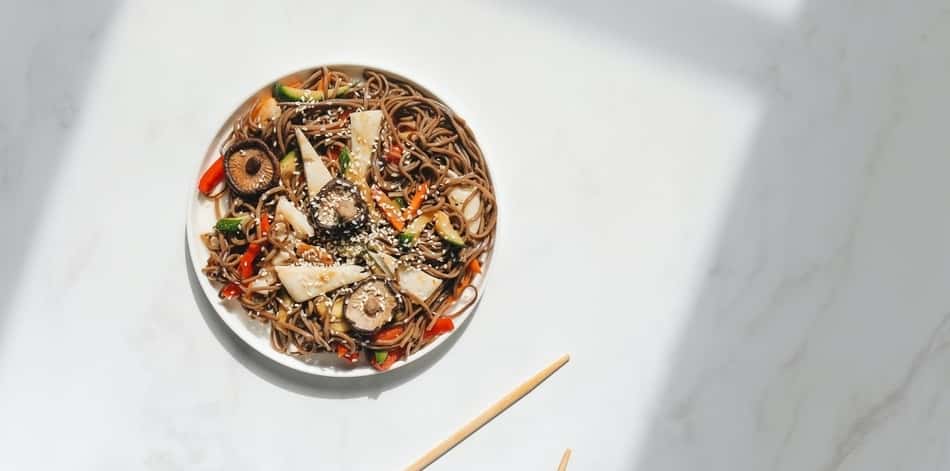
Can You Eat Whatever You Want In A Calorie Deficit And Still Lose Weight?
You can eat whatever you want in a calorie deficit and still lose weight because weight loss is driven by negative energy balance from the calories, regardless if those calories are coming from plant-based foods, meats, processed foods, or whole foods.
So when you think about it, regardless if you’re eating plant-based, animal products, high-carb or low carb, ketogenic or paleo diet, you will lose weight, as long as you are in a caloric deficit (source).
See the graph below.
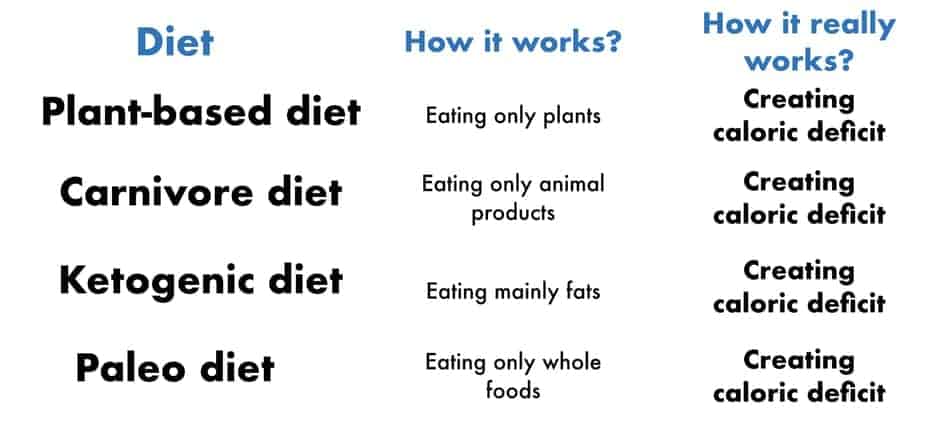
On your left, you have a list of different diets. In the middle, I’ve written a brief definition of each diet, and on your right, you have the mechanisms of how they actually work.
All those diets are seemingly so different but the truth is that all of those diets work. And they work not by reducing or eliminating some specific food item.
They all work because of a caloric deficit.
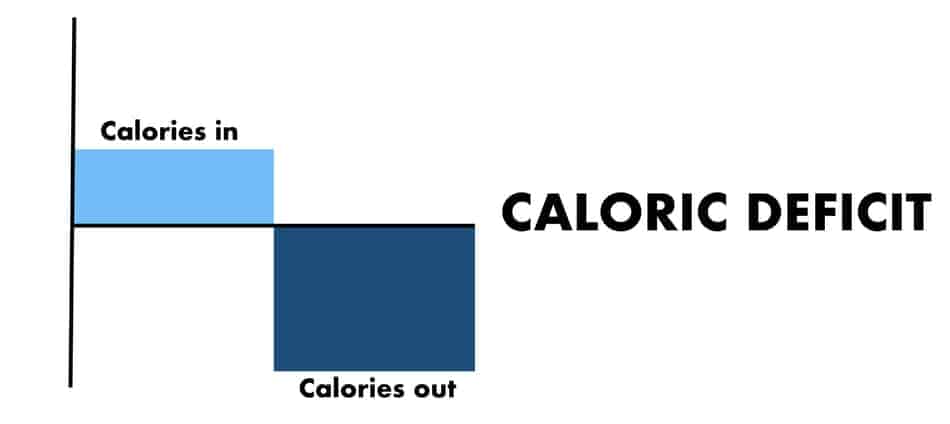
So as long as you’re in a caloric deficit, this means you will lose weight. There is no other way around it. You may hear people saying things like “you can eat what you want”.
Which is true.
Doesn’t matter if you eat chicken, eggs, or bananas all the time. If you eat less than your body needs, you will drop weight instantly.
Does it Matter What You Eat As Long As You Stay Within Calories?
It doesn’t matter what you eat as long as you stay within calories to lose weight because weight loss is triggered by a caloric deficit, independent of the method or the food you eat.
Does it mean you can only eat sweets and chocolate now? Not really.
You can eat carbs, pasta, bread, or McDonald’s and still lose weight, as long as you eat less.
Can You Eat Sweets On A Calorie Deficit?
You can eat sweets on calorie deficit because as long as you are in a negative energy balance, it will lead to weight loss, regardless if you eat sweets or not. Also, having sweets during a caloric deficit can help to combat the cravings that occur after long-term caloric restrictions.
In other words, it is psychologically healthy to have something sweet, even on a daily or weekly basis. Over time, food cravings can start to build up and create unnecessary stress (source).
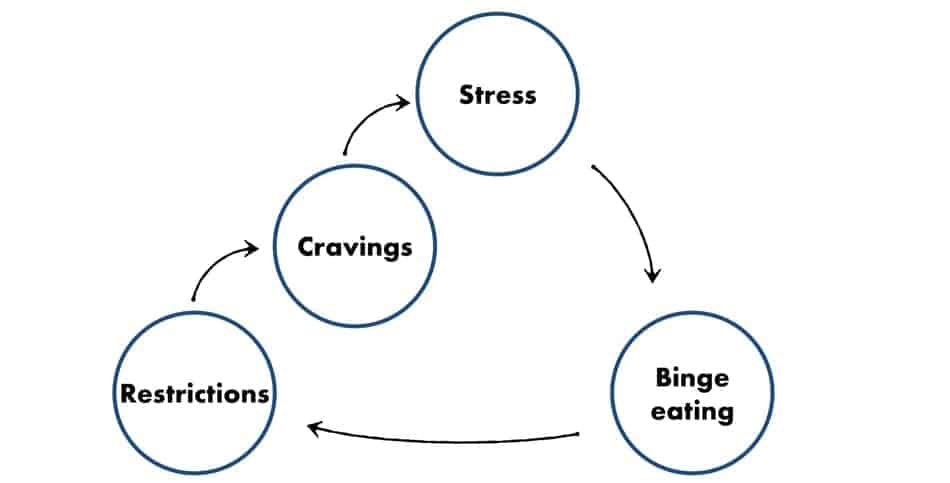
And with more stress, where all you can think of is something sweet, the sooner you will satisfy this craving, the less damage it will cause.
Because if you disregard those cravings, and you let them build up, eventually it can lead to binge eating that will last not one meal, but a whole day or even a whole week.
So having some sweet ritual daily is a good way to keep your cravings at the bay, and kill the monster while it’s little. Not when it’s gonna eat the city. A great example is a dark chocolate, where all you need is just a little bit.
Related article: Can I Eat Chicken And Rice Everyday?
Can You Eat Chocolate On A Calorie Deficit?
You can eat chocolate on a calorie deficit because a calorie deficit is generated by the difference between calories consumed and calories expended, no matter what you choose to eat. In fact, a small piece of dark chocolate can be an effective way to satisfy food cravings.
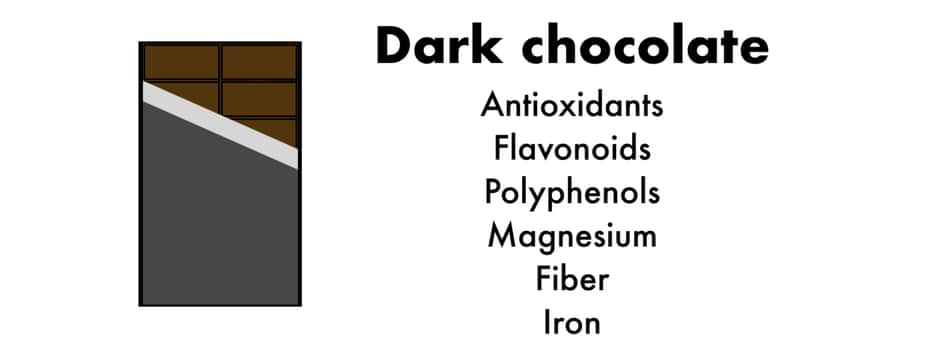
Dark chocolate is lower on fat, it is denser, and has a rich cocoa taste. This means all you need is a couple of pieces to satisfy your cravings for sweets or for chocolate. 70% dark chocolate will do its job.
On the other hand, regular milk chocolate has more fat, therefore it increases your palatability (taste) and can stimulate your appetite to eat more, not less. That’s why you can end up eating the whole chocolate bar with regular milk chocolate, wherewith the dark chocolate you are done after 2 small pieces.
Another thing that will stimulate your appetite like no tomorrow is variety. So if you buy chocolate that has all the bells and whistles like raisins, nuts, milk, and other gadgets, it will make you eat more, not less.
Related article: Can I Drink Coconut Water On OMAD?
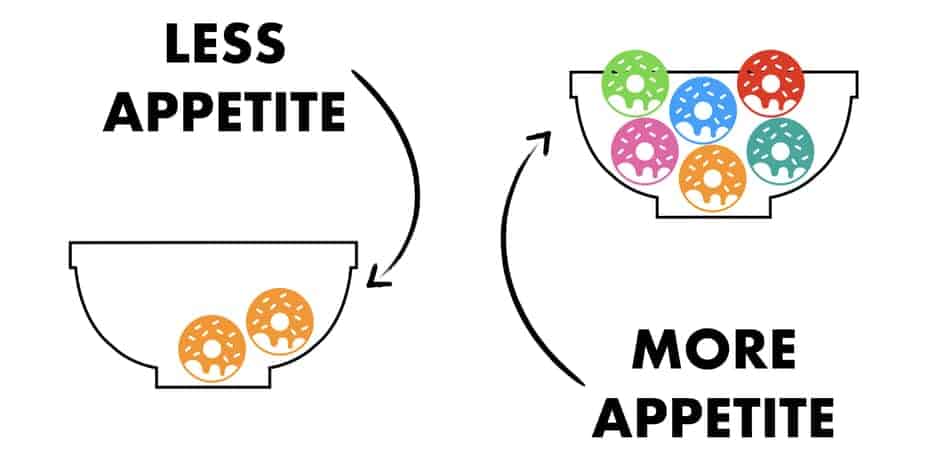
Same with ice-creams, same with cakes, same with anything really.
This is called sensory-specific satiety (source). The more variety you have, you end up eating more, not less. On the flip side, the less variety you have, your appetite goes down.
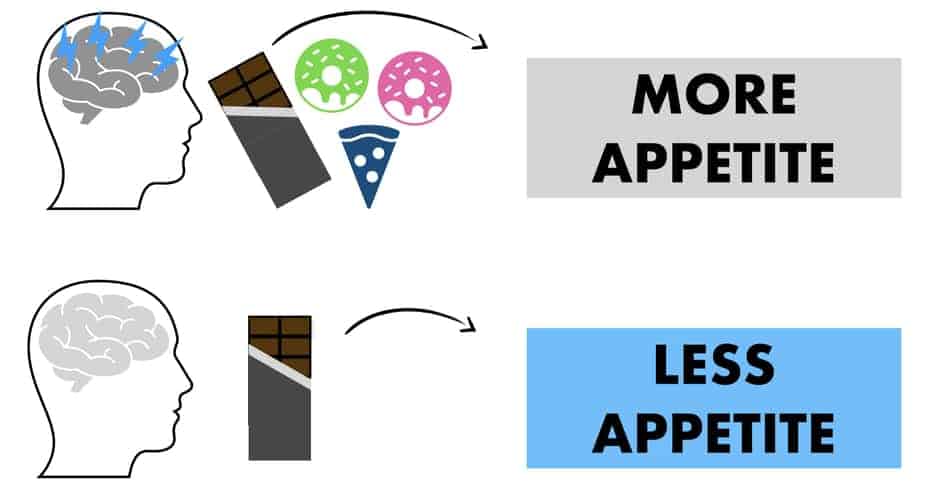
What about junk food?
Related article: Can I Drink Diet Coke On OMAD?
Can You Eat Junk Food On A Calorie Deficit?
You can eat junk food on a calorie deficit because calorie deficit works independently, regardless of the type of food you choose to eat. However, for the long-term results, eating only junk food won’t deliver all the essential nutrients, therefore it can make you feel progressively worse.
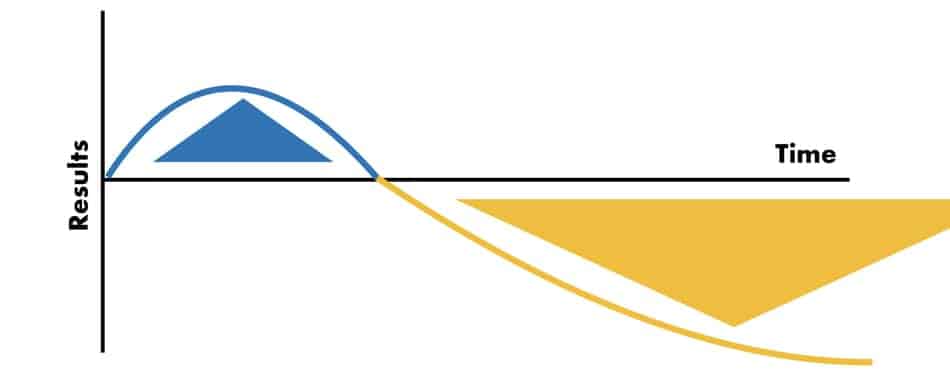
This means that there is nothing wrong with eating junk food from time to time. Remember that to lose weight, you need to be in a caloric deficit for a long time. This means you need to be resilient, psychologically healthy, and have realistic expectations.
Therefore, having a moment from time to time where you deviate from your goal and eat some junk food is acceptable.
Related article: How Much Should You Cheat On A Cheat Day?

And this is not a life or death situation. You’re not doing anything wrong by eating junk food from time to time. Food is to be eaten, and it shouldn’t be really classified as good or bad.
Of course, every decision has consequences. I’m a strong believer that life is to be lived to some extend, and instead of telling you what you shouldn’t eat, I prefer to explain or somehow describe the consequences.
Junk food does taste good, especially after you’ve been doing caloric deficit for a while. But if you want to live on junk food while dieting, this won’t last for too long.
Junk food doesn’t deliver all the essential nutrients that you need on a daily basis, so sooner or later you will feel worse, not better.
You wanna know how to stop eating junk food?
There is one trick that you can start doing today to literally eat less junk food. Not because you have to. But because you want to.
Eating Junk Food But Staying Under Calories
If you’re eating junk food but staying under calories you will still lose weight because the caloric deficit is driven by the food amount, regardless of what type of food you consume. However, it is much easier to choose whole, minimally processed foods to keep your satiety high.
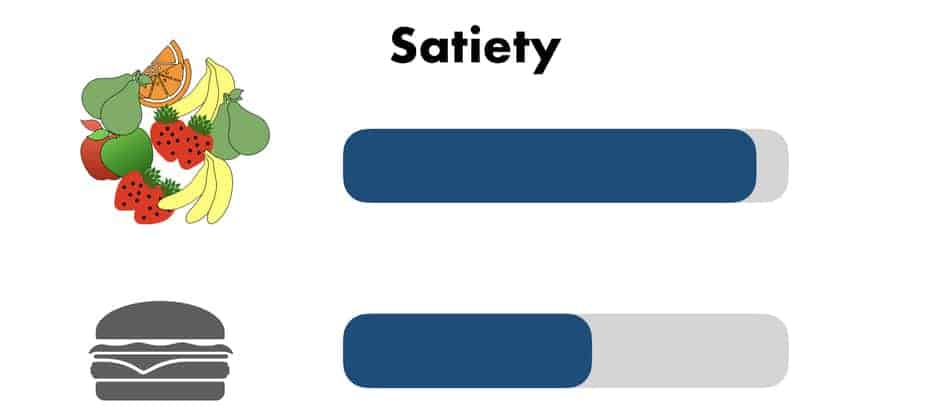
Also, one cool ninja trick you can start doing today to eat less junk food and focus on whole foods instead is eating slowly. Eating slowly, like 20 minutes or even more, will stimulate your nasal chemosensory and olfactory systems (source).
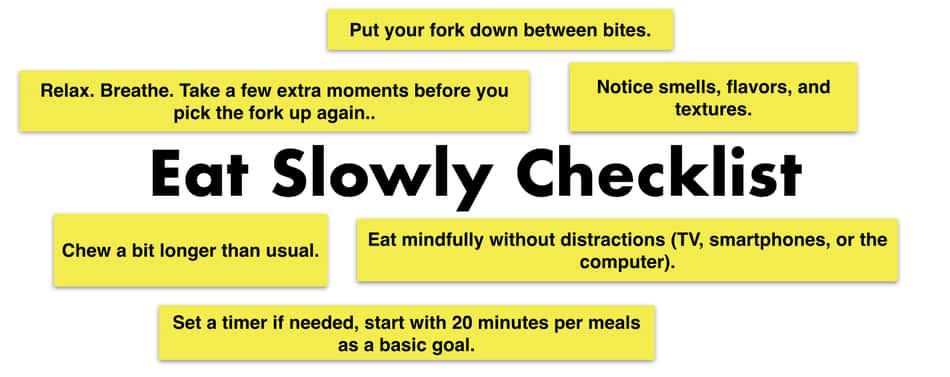
This means you will get more sensitive to the taste and smell of the food when you consciously slow down. This way whole foods start to taste like real food. And junk food tastes horrible. It’s kind of disappointing really – even disgusting really.
If you don’t believe me, try to chew one Dorito chip for 5 minutes and you will know what I mean. To learn more about eating slowly and how it can help you check out my article on how to stop counting calories.
Conclusion
To succeed on the caloric deficit and come out the other side with a brand new body and feeling better than ever before you need some self-compassion. You cannot live only by the rules and disregard the fact that food is for pleasure.
So instead of twisting and bending over backward to fight against restrictions, it’s better to have some treat yourself here and then. And when it comes to the birthday, we all gonna have a birthday cake. And even if that sweet or junk food will set you back for a few days, it’s ok.
Ciao for now.
